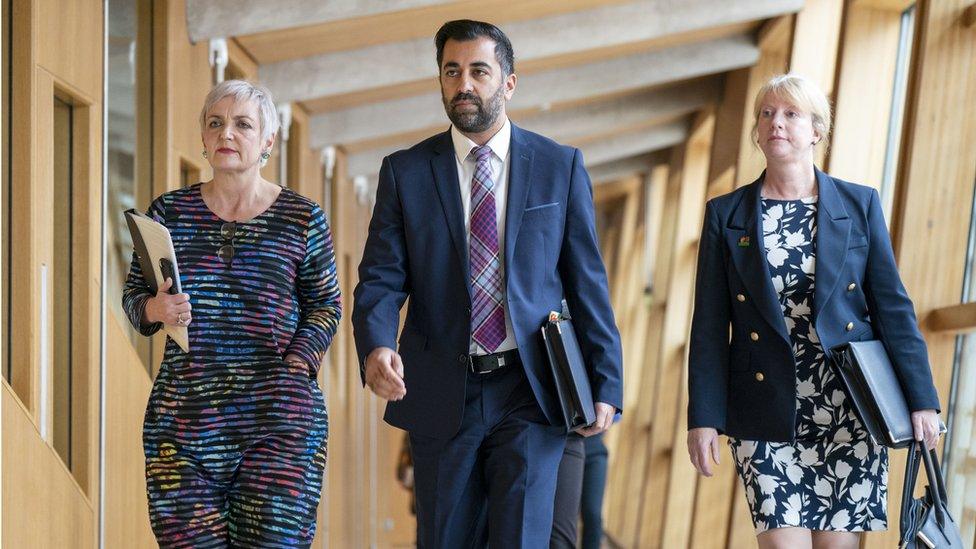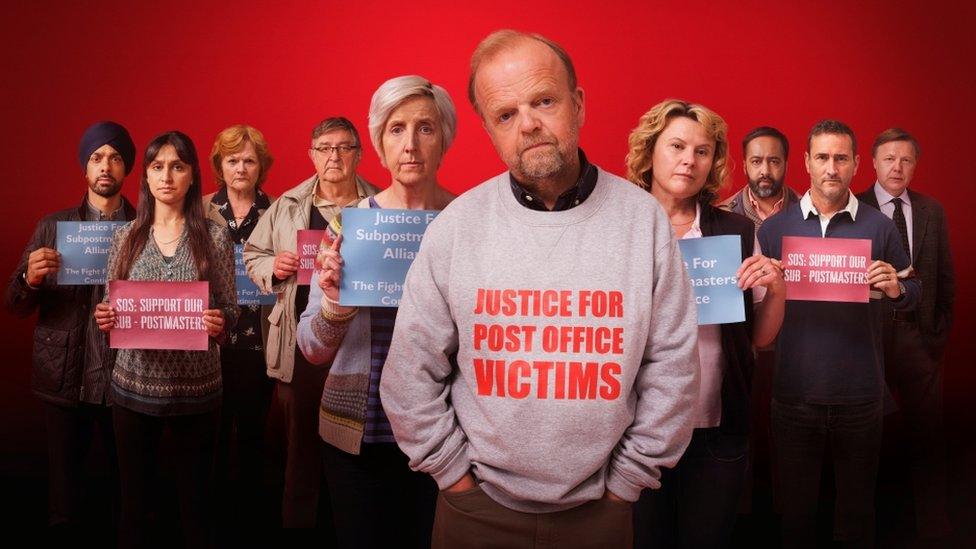How easy will it be to clear Scottish postmasters?
- Published

First Minister Humza Yousaf has pledged that all victims of the scandal in Scotland will be cleared
Rishi Sunak and Humza Yousaf have found something they agree on - that post office branch managers wrongly convicted in the Horizon scandal should be cleared.
What they do not yet agree on is how that should be achieved in Scotland.
When it became clear that the UK government was considering legislation to overturn convictions in England and Wales, the Scottish government said it was looking at doing something similar.
Then when Rishi Sunak actually announced his plans, the Scottish position shifted with Humza Yousaf calling for a UK-wide solution - not necessarily the default position of an independence supporting politician.
The first minister has suggested that the "easiest and fastest" solution could be for Westminster legislation to be extended to cover Scottish cases with Holyrood's approval.
He has offered to work with UK ministers to find a way forward and his justice secretary, Angela Constance has written to her UK counterpart, Alex Chalk seeking urgent talks.
The Scottish government is still keeping open the option of drafting its own legislation but is concerned that doing so could inadvertently prevent Scottish post office managers accessing the UK compensation scheme.
At the moment, the compensation scheme is only open to those who are cleared in the appeal courts or were members of a group of sub-postmasters who settled with the Post Office in 2019.
So, if Holyrood overturned Scottish convictions it would probably still need Westminster to change the rules of the scheme to ensure those cleared in this way could still claim compensation.
Maybe a one-size-fits-all approach across the UK would be simpler. Except that the prime minister's official spokesman has already suggested that may be tricky.
"We want to work with relevant bodies in Scotland and Northern Ireland on this matter. It is not something we can do cross-UK," he said.
Another UK government source told me they were "looking into it" but that it's "not straightforward" to overturn convictions in Scotland.

The scandal was pushed to the top of the political agenda by the ITV drama Mr Bates vs the Post Office
This source suggested a blanket pardon may be easier to do but would fall short of the full exoneration that the UK government believes is required.
Holyrood has previously passed legislation pardoning miners for activities during the strikes in the 1980s and pardoning gay and bisexual men who have historic convictions for sexual activities with other men.
It was suggested to me by a Scottish government source that these laws might offer a starting point for clearing post office branch managers.
Again, the problem would be that a pardon is not the same as quashing a conviction, making clear that it was wrong in the first place.
I don't pretend to fully understand the legal complexities these unusual circumstances present.
Scotland and England are different legal jurisdictions and in Scotland, the Crown Office and procurator fiscal service acted as the prosecutor.
In England and Wales, the post office took many of the cases to court itself.
That difference may well be one of the key issues that government lawyers need to work through.
However, if both the Scottish and UK governments are determined to find a way forward then the expectation must be that that is what will happen.
The Horizon scandal leaves huge questions for the Post Office, ministers of all political varieties and a range of prosecuting authorities - questions being explored by a UK public inquiry.
At Holyrood question time, the focus turned on the role of the Crown Office and procurator fiscal service (COPFS) and whether it responded appropriately in 2013 when it was made aware of concerns about the Horizon evidence.
Both the Conservatives and Labour are now demanding that the Lord Advocate, Dorothy Bain - who heads up the Crown Office - makes a statement to parliament.
Her office has confirmed she is willing to do so.
The Lord Advocate is a minister in the Scottish government and its chief legal adviser as well as Scotland's chief prosecutor - which is a separate and independent function.
This dual role often causes confusion and from time to time raises concerns about potential conflicts of interest.
The current Lord Advocate has only been in post since 2021. Frank Mulholland held the position 2011-2016 - the period during which prosecutions that relied on Horizon evidence were eventually stopped.
Deputy Crown Agent, Kenny Donnelly said: "As an independent and impartial prosecution service, COPFS is determined to ensure that all miscarriages of justice resulting from unreliable evidence obtained from the Horizon system are identified and overturned so that those affected can access the compensation and redress that they are entitled to".
His boss, the Lord Advocate, is expected to face detailed questioning by MSPs at some point next week.